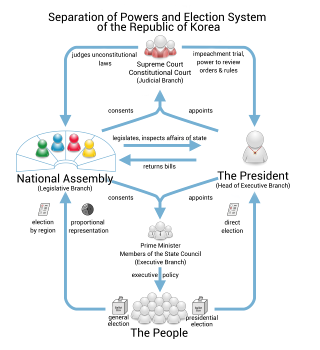
The politics of South Korea take place in the framework of a presidential representative democratic republic, whereby the president is the head of state, and of a multi-party system. To ensure a separation of powers, the Republic of Korea Government is made up of three branches: legislative, executive, and judicial. The government exercises executive power and legislative power is vested in both the government and the National Assembly. The judiciary is independent of the executive and the legislature and comprises a Supreme Court, appellate courts, and a Constitutional Court.
Sri Lanka is a unitary multi-party semi-presidential representative democratic republic, whereby the President of Sri Lanka is both head of state and head of government. Executive power is exercised by the President on the advice of the Prime Minister and the Cabinet of Ministers. Legislative power is vested in the Parliament.
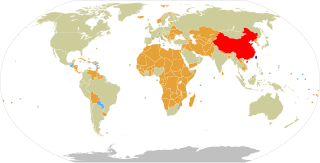
Foreign relations of the Republic of China (ROC), more commonly known as Taiwan, are accomplished by efforts of the Ministry of Foreign Affairs of the Republic of China, a cabinet-level ministry of the Government of the Republic of China. It currently has formal diplomatic relations with 11 of the 193 United Nations member states and with the Holy See, which governs the Vatican City State, as of 13 May 2024. In addition to these relations, the ROC also maintains unofficial relations with 59 UN member states, one self-declared state (Somaliland), three territories (Guam, Hong Kong, and Macau), and the European Union via its representative offices and consulates. In 2021, the Government of the Republic of China had the 33rd largest diplomatic network in the world with 110 offices.

The United Nations Economic and Social Council (ECOSOC) is one of the six principal organs of the United Nations, responsible for coordinating the economic and social fields of the organization, specifically in regards to the fifteen specialized agencies, the eight functional commissions, and the five regional commissions under its jurisdiction.

The Christian Democratic Union of Germany is a Christian democratic and conservative political party in Germany. It is the major catch-all party of the centre-right in German politics.

The Bharatiya Janata Party is a political party in India and one of the two major Indian political parties alongside the Indian National Congress. Since 2014, it has been the ruling political party in India under the incumbent Prime Minister Narendra Modi. The BJP is aligned with right-wing politics and has close ideological and organisational links to the Rashtriya Swayamsevak Sangh (RSS) volunteer paramilitary organisation. Its policies adhere to Hindutva, a Hindu nationalist ideology. As of January 2024, it is the country's biggest political party in terms of representation in the Parliament of India as well as state legislatures.

The International Democracy Union is an international alliance of centre-right political parties. Headquartered in Munich, Germany, the IDU consists of 84 full and associate members from 65 countries. It is chaired by Stephen Harper, former prime minister of Canada. It has two affiliated international organizations and six affiliated regional organizations.
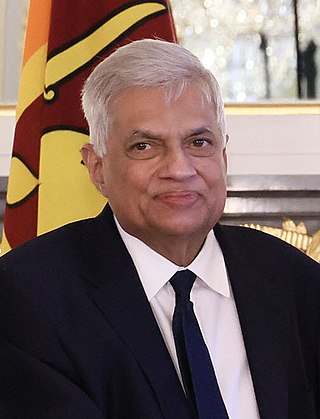
Ranil Wickremesinghe is a Sri Lankan politician who is the 9th and current President of Sri Lanka. He also holds several ministerial positions, including the Minister of Finance, Minister of Defence, Minister of Technology and Minister of Women, Child Affairs and Social Empowerment.
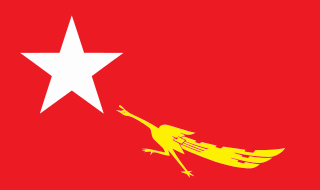
The National League for Democracy is a deregistered liberal democratic political party in Myanmar (Burma). It became the country's ruling party after a landslide victory in the 2015 general election but was overthrown in a military coup d'état in February 2021 following another landslide election victory in 2020.

The United National Party is a centre-right political party in Sri Lanka. The UNP has served as the country's ruling party, or as part of its governing coalition, for 38 of the country's 74 years of independence, including the periods 1947–1956, 1965–1970, 1977–1994, 2001–2004 and 2015–2019. The party also controlled the executive presidency from its formation in 1978 until 1994 and back in 2022.

Abdul Qasim Mohammad Badruddoza Chowdhury served as the President of Bangladesh from 14 November 2001 until his resignation on 21 June 2002. He was the founding secretary-general of Bangladesh Nationalist Party (BNP).
Ukraine International Airlines PJSC, often shortened to UIA, is the flag carrier and the largest airline of Ukraine, with its head office in Kyiv and its main hub at Kyiv's Boryspil International Airport. It operates domestic and international passenger flights and cargo services to Europe, the Middle East, the United States, Canada, and Asia. Due to Russia's 2022 invasion, all flights have been cancelled since 24 February 2022. The airline has ceased all operations, and the fleet has been parked at Kyiv Boryspil with the exception of one Embraer 190, UR-EMC, parked in Odessa. The airline won't be operating until the war ends and the ban on civilian flights in Ukrainian airspace is lifted. Resumption of operations also depends on whether the fleet of aircraft - or a sufficient share of it - remains intact throughout the war.
Henry Charles Usborne was a British Labour Party politician and peace activist who defected to the Liberal Party.

General elections were held in Myanmar on 7 November 2010, in accordance with the new constitution, which was approved in a referendum held in May 2008. The election date was announced by the State Peace and Development Council (SPDC) on 13 August.

The Socialist International (SI) is a political international or worldwide organisation of political parties which seek to establish democratic socialism, consisting mostly of social-democratic political parties and labour organisations.

The Great Indonesia Movement Party, better known as the Gerindra Party, is a nationalist, right-wing populist political party in Indonesia. Since 2014, it has been the third-largest party in the House of Representatives (DPR), having secured 86 seats in the last election. It is led by the former army general and the president-elect of Indonesia Prabowo Subianto.
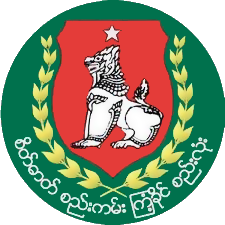
The Union Solidarity and Development Party is an ultranationalist, pro-military political party in Myanmar. Alongside the National League for Democracy, it is one of Myanmar's two principal national parties. USDP is the successor to the former ruling military junta's mass organisation, the Union Solidarity and Development Association, and serves as the electoral proxy of the Tatmadaw (military), which operates as a state within a state. Many of its political candidates and leadership are retired generals. It supports authoritarian military leadership. USDP was founded by Prime Minister Thein Sein to contest the 2010 Myanmar general election; the party was headed by Sein until 2013. Since 2022, it has been led by Khin Yi, who was installed as a loyalist of military leader Min Aung Hlaing.

Parliamentary elections were held in Sri Lanka on 17 August 2015, ten months ahead of schedule, to elect 225 members to Sri Lanka's 15th Parliament.

The Sri Lanka People's Front, commonly known by its Sinhalese name Sri Lanka Podujana Peramuna (SLPP), is a political party in Sri Lanka. Previously a minor political party known as the Sri Lanka National Front (SLNF) and Our Sri Lanka Freedom Front (OSLFF), it was relaunched in 2016 as the SLPP and became the home for members of the United People's Freedom Alliance loyal to its former leader Mahinda Rajapaksa.
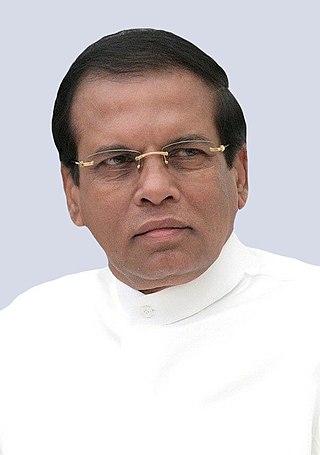
A constitutional crisis began in Sri Lanka when President Maithripala Sirisena appointed former president and member of parliament Mahinda Rajapaksa as Prime Minister on 26 October 2018 before formally dismissing the incumbent Ranil Wickremesinghe, resulting in two concurrent Prime Ministers. Wickremesinghe and the United National Party (UNP) viewed the appointment as illegal, and he refused to resign.

















